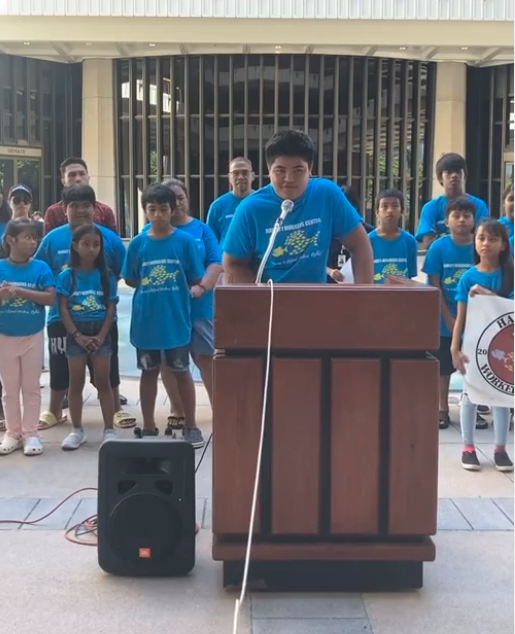Recovery the right way: A just and equitable recovery
by Sergio Alcubilla, Executive Director, Hawaiʻi Workers Center | Reading time: 4.5 minutes
This past month has been a difficult time for the people of Hawaiʻi. The lives of thousands of people have been changed forever. We watched images of our neighbors fleeing in fear, jumping into the ocean as a last resort, and doing whatever they could to escape the raging fires. For those that lived through the tragedy, words are still difficult to come by. As a community, we grieved together, we consoled each other, and we did what we could to uplift one another. The incredible outpouring of support and sense of taking care of one another was and continues to be special.
While we continue to ensure that the most basic needs of those impacted are met, we must now turn our attention to ensuring a full, equitable, and just recovery. The words of President Biden during his visit to Maui come to mind, “You know, we will be respectful of these sacred grounds and the traditions that rebuild the way the people of Maui want to build, not the way others want to build. We’re going to rebuild the way the people of Maui want to build.”
We at the Hawaiʻi Workers Center believe in applying two core principles in the long term recovery efforts. First, no one is left behind; and second, those directly affected must be front and center in designing the recovery efforts. After listening to members of our Maui Tenants Association and other affected families, early on we submitted a letter to Governor Green and Mayor Bissen outlining the following proposals needed to meet urgent short term needs and achieve a just long-term recovery:
We need at least a 1-year moratorium on evictions, rent increases, and foreclosures and a ban on predatory buying of homes and land.
Displaced residents should be allowed to shelter in or be a guest in a dwelling for up to one year or until 2,000 units of affordable housing have been added to the housing supply.
The State Department of Labor and Industrial Relations (DLIR) must activate its crisis response and undertake to ensure the following for Maui’s unemployed workers. Unemployment checks must be issued to applicants within 30 days after application is made, and there should be a 60-day grace period for Maui applicants who may lack some needed documentation. During the grace period, payments should commence while Maui applicants have time to recover/replace documents. DLIR must be adequately staffed to ensure a timely application and payment process; we cannot afford to see what happened with unemployment claims during the pandemic when thousands went without or waited several months to receive benefits. The DLIR should provide in-person assistance and go to shelters, hotels and community centers to help workers apply for UI benefits. DLIR must comply with language access requirements. For claimant eligibility and calculating payment amounts, periods of self-employment and mixed employment should be allowed and included.
This is not the time to exclude anyone. Use available community development block grant funds and private donations to provide cash assistance to members of our Maui community who are not eligible for cash assistance from FEMA due to their immigration status. This is especially important for our COFA (Compact of Free Association) migrant families on Maui, who make up a large and important part of the community.
Hawaiʻi should immediately request federal Disaster Supplemental Nutrition Assistance Program (D-SNAP) which can help all with food needs regardless of immigration/migration status. The federal government should immediately approve this request.
The youth from Pacific Voices, delivered the letter and these proposals directly to the Office of the Governor. Representing many of the island nations in the Pacific, the youth reminded us of our environmental sins of the past but also gave us hope in our shared future. To date, we have not had an immediate response to our proposals.
While we begin to reflect on the one month anniversary of this disaster, we know that many have indeed been left behind and the voices of those directly affected have not always been front and center. Those needing unemployment insurance benefits continue to wait, often frustrated by the challenges of language access and antiquated technology. Tenants’ fears of being evicted by landlords who saw opportunity in this disaster are becoming real. And much needed conversations on restoring natural resources and protecting our land and water from corporate interests are again being silenced.
Now, the real work begins. As our families and community look to rebuild, we simply cannot return to the status quo. We long for an economy that works for all of us, not just for those at the top. We long for a society in which working class people are respected and valued for their worth and not just for their labor. We long for real justice and mutual prosperity to finally replace the exploitation and greed that this land and her people have long experienced.
Please take a moment now to email or call the governor at 808-586-0034 and urge him to implement the demands listed above to meet Maui’s urgent short term needs and help achieve a just long-term recovery.
The Hawaiʻi Workers Center and the Sierra Club of Hawaiʻi stand in solidarity in ensuring that our working class and vulnerable families are not put at the mercy of corporate interests. We stand in solidarity to ensure that our waters and the land that sustain us are protected for future generations. From Red Hill to the waters that flow through Maui’s streams, we remain steadfast in our belief that the life of the land is perpetuated in righteousness, “Ua Mau ke Ea o ka ʻĀina i ka Pono.”


